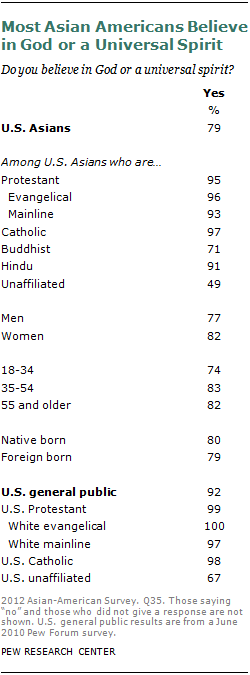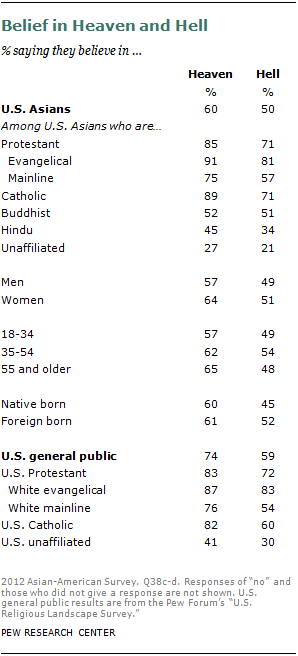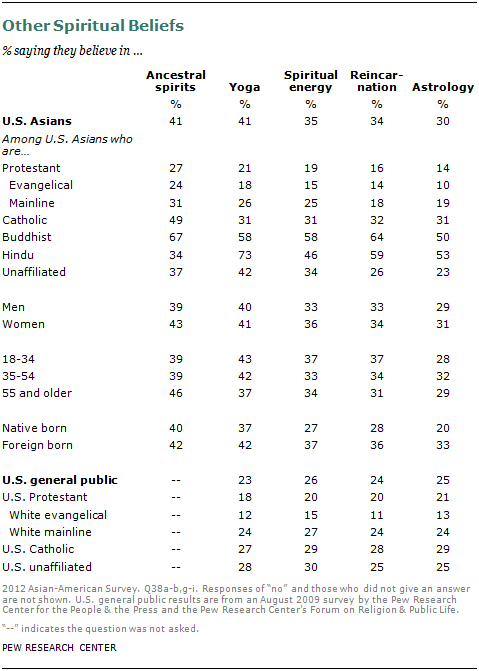At first glance, Asian Americans appear to place less importance on religion than does the U.S. public overall. As discussed in the previous chapter, Asian Americans are less likely than Americans as a whole to say religion is very important in their lives. Asian Americans are also somewhat less likely to be affiliated with a religious tradition.
These apparent differences, however, largely reflect the religious composition of the Asian American population—including the relatively large share of Buddhists, Hindus and the unaffiliated. When it comes to questions about specific religious beliefs—including belief in God and views of Scripture—Asian-American Christians tend to resemble Christians in the general public.
Asian-American Protestants—especially those who are born-again or evangelical—are more strict in their religious beliefs on some measures than Protestants in the general public. For example, Asian-American Protestants are much more likely than U.S. Protestants overall to say theirs is the one, true faith leading to eternal life and to say there is only one true way to interpret the teachings of their faith.
Asian-American Hindus and Buddhists, by contrast, tend to be very inclusive in their understanding of their own faith. Strong majorities of both groups reject the notion that their religion is the one, true faith leading to eternal life (or enlightenment) and say instead that many religions can lead to eternal life (or enlightenment). The vast majority of Hindus and Buddhists also say there is more than one true way to interpret the teachings of their religion.
The distinctive religious composition of the Asian-American population also helps explain why U.S. Asians are less likely than the public overall to believe in God, as well as more likely to believe in reincarnation and to view yoga not just as exercise but as a spiritual practice.
Belief in God

About eight-in-ten Asian Americans (79%) say they believe in God or a universal spirit. Among the general public, 92% express this view.
There is near consensus among both Asian-American Christians and Christians in the general public on belief in God. Fully 95% of Asian-American Protestants express belief in God, as do 99% of Protestants overall. The same is true among Catholics: 97% of Asian-American Catholics and 98% of U.S. Catholics overall say they believe in God.
Nine-in-ten Asian-American Hindus (91%) also profess belief in God.
Because Buddhists often view their religion in non-theistic terms—simply put, many see Buddhism as a path toward spiritual awakening or enlightenment rather than as a path to God—it is not surprising that the proportion of Asian-American Buddhists who say they believe in God or a universal spirit is significantly lower (71%) than among Asian-American Christians and Hindus.36
Among Asian Americans who are religiously unaffiliated, about half say they believe in God (49%). The proportion of unaffiliated adults in the general public who believe in God is considerably higher (67%).
Younger Asian Americans (ages 18 to 34) are less likely than older Asian Americans to believe in God. But there are no significant differences on this question by gender or nativity group (foreign born vs. native born).
Views of Sacred Scripture
Asian Americans are less likely than the U.S. public overall to say the Bible and other works of Scripture are the word of God and should be taken literally, word for word.37 But here again, Asian-American Christians tend to resemble Christians in the general public. For example, Asian-American Catholics’ views of the Bible are nearly identical to the views of U.S. Catholics as a whole. Seven-in-ten Asian-American Catholics (72%) say the Bible is the word of God, as do the same number of Catholics overall. And 29% of Asian-American Catholics say the Bible should be interpreted literally, as do 27% of Catholics in the general public.
Among Asian-American Protestants, 86% view the Bible as the word of God, as do 82% of Protestants overall. But there are some differences among subgroups of Protestants. Asian-American mainline Protestants are more likely than white mainline Protestants to say the Bible is the word of God (75% vs. 64%), and they are also more likely than white mainline Protestants to interpret the Bible literally (26% vs. 17%).
About nine-in-ten Asian-American evangelicals (94%) view the Bible as the word of God, as do a similar number of white evangelicals in the general public (92%). However, Asian-American evangelicals are less likely than white evangelicals to interpret the Bible literally. About half of Asian-American evangelicals (52%) say the Bible should be interpreted literally, compared with two-thirds of white evangelicals (65%).
Compared with Asian-American Christians, fewer Hindus and Buddhists say that their religion’s sacred texts are the word of God. Roughly a third of Asian-American Hindus (36%) say that Hinduism’s Holy Scripture is the word of God, including 9% who say these writings should be interpreted literally. Among Asian-American Buddhists, about one-in-four (24%) say their religion’s Holy Scripture is the word of God, including 10% who say their sacred texts should be taken literally. While the question asked of Asian-American Buddhists and Hindus closely paralleled that asked of Christians, differences in responses among these groups may reflect different understandings of “Holy Scripture” as a collective term for multiple texts.
Most Asian Americans who are religiously unaffiliated describe the Bible as written by men (68%). This is somewhat higher than among the unaffiliated in the general public (57%).
Beliefs about Scripture are linked to age. Younger Asian Americans (ages 18 to 34) are more likely than older generations to see Scripture as written by men, and younger Asian Americans are less likely than older generations to say Scripture should be interpreted literally.

Many Ways to Reach Eternal Life, Interpret Faith

Among Asian Americans who are affiliated with a religious tradition, most (63%) believe that many religions can lead to eternal life. Far fewer say that their religion is the one, true faith leading to eternal life (29%).
Overall, Asian Americans closely resemble the general public on this question. There are striking differences, however, between Asian-American Protestants and Protestants in the general public.
Among Asian-American evangelicals, 72% believe their religion is the one, true faith leading to eternal life. By contrast, only about half of white evangelicals in the general public (49%) express this point of view. Compared with Asian-American evangelicals, the percentage of Asian-American mainline Protestants who say their religion is the one, true faith leading to eternal life is much lower (36%). However, this group is almost three times as likely as white mainline Protestants (13%) in the general public to say theirs is the one, true faith.
Compared with Asian-American Protestants (especially evangelicals), far fewer Asian-American Catholics (23%) say their religion is the one, true faith; nearly three-quarters of Asian-American Catholics (73%) say many religions can lead to eternal life. Asian-American Catholics closely resemble Catholics in the general public on this question.

Just 4% of Asian-American Hindus say their faith is the only one leading to eternal life, while about nine-in-ten (91%) say many religions can lead to eternal life. Similarly, just 11% of Asian-American Buddhists say their faith is the one true path leading to enlightenment; roughly eight-in-ten say many religions can lead to enlightenment (79%).
Most religiously affiliated Asian Americans believe the teachings of their religion can be interpreted in many ways. Two-thirds believe there is more than one true way to interpret the teachings of their faith (67%), while about a quarter believe there is only one true way (24%).
Here again, the beliefs of Asian Americans closely resemble the views of the public overall. But Asian-American Protestants are more inclined than Protestants in the general public to say there is only one correct way to interpret their faith (42% and 32%, respectively).
The belief that there is only one true way to interpret their faith is most common among Asian-American evangelicals, with 53% expressing this view. Far fewer Asian-American mainline Protestants (28%) and Catholics (23%) take this position. And even fewer Buddhists (11%) and Hindus (5%) say there is only one true way to interpret their faith.
Among those with a religious affiliation, younger Asian Americans are more likely than older generations to say there are many ways to interpret their faith. Men with a religious affiliation are a bit more inclined than women to say there are many ways to interpret their faith.
Heaven and Hell

Asian Americans are somewhat less likely than the general public to believe in heaven and hell. Six-in-ten Asian Americans (60%) say they believe in heaven, defined in the survey as a place where people who have led good lives are eternally rewarded. Half say they believe in hell (50%), where people who have led bad lives and die without repentance are eternally punished. Among the U.S. general public, 74% believe in heaven and 59% believe in hell.
Asian-American Christians tend to resemble Christians in the general public in their views of heaven and hell. Among Asian Americans, about nine-in-ten evangelical Protestants (91%) and Catholics (89%) believe in heaven, as do three-quarters of mainline Protestants. Eight-in-ten Asian-American evangelicals (81%) believe in hell, as do 71% of Catholics. Fewer Asian-American mainline Protestants believe in hell (57%). These figures are roughly comparable with or even slightly higher than those seen among white evangelicals, Catholics and white mainline Protestants in the general public.
Belief in heaven and hell tends to be less common among Asian-American Buddhists, Hindus and the religiously unaffiliated than among Asian-American Christians. About half of Asian-American Buddhists believe in heaven (52%) and hell (51%). Among Asian-American Hindus, nearly half believe in heaven (45%) and about a third believe in hell (34%).
Roughly three-in-ten religiously unaffiliated Asian Americans believe in heaven (27%), and one-in-five believe in hell (21%). These numbers are lower than among the overall unaffiliated public (41% believe in heaven, 30% believe in hell).
Angels and Evil Spirits

About six-in-ten Asian Americans (58%) believe in angels. Belief in angels is most common among Asian-American evangelicals (91%) and Catholics (86%), followed by mainline Protestants (74%). Far fewer Asian-American Buddhists (49%), Hindus (38%) and the religiously unaffiliated (25%) believe in angels.
More Asian-American women than men believe in angels (63% and 53%, respectively). And Asian Americans who are ages 55 and older are more likely than younger adults (ages 18 to 34) to believe in angels.
Half of Asian Americans (51%) say they believe in evil spirits. Eight-in-ten Asian-American evangelicals (81%) believe in evil spirits, as do two-thirds of Catholics (67%) and nearly six-in-ten mainline Protestants (58%). About half of Asian-American Buddhists (54%) say they believe in evil spirits. Belief in evil spirits is much less common, however, among Asian-American Hindus (28%) and those who are religiously unaffiliated (29%).
Comparisons with the general public are not available on these beliefs.
Ancestral Spirits, Spiritual Energy, Yoga, Reincarnation and Astrology
Roughly four-in-ten Asian Americans believe in ancestral spirits (41%), and the same proportion believes in yoga not just as exercise but as a spiritual practice. About a third of Asian Americans (35%) believe in spiritual energy located in physical things such as mountains, trees or crystals. Roughly as many believe in reincarnation (34%), that people will be reborn in this world again and again. And three-in-ten believe in astrology, that the position of the stars and planets can affect people’s lives.
While a significant minority of the general public shares these beliefs, they tend to be more widely embraced by Asian Americans.38 For instance, 23% of the general public expresses belief in yoga as a spiritual practice, compared with 41% of Asian Americans overall.
Buddhists stand out from other Asian-American religious groups for high levels of belief in ancestral spirits (67%) and spiritual energy located in physical things (58%). Hindus stand out from other Asian-American religious groups for their high level of belief in yoga as a spiritual practice (73%). Buddhists and Hindus are also more likely than other Asian-American religious groups to believe in reincarnation and astrology.

Compared with Buddhists and Hindus, fewer Asian-American Christians share these spiritual beliefs. Asian-American Christians tend to resemble Christians in the general public on these measures. For example, three-in-ten Asian-American Catholics (31%) believe in yoga as a spiritual practice, about the same proportion as among Catholics in the general public (27%). A similar share of Asian-American Catholics (32%) and Catholics in the general public (28%) believe in reincarnation.
However, Asian-American Buddhists and Catholics are more likely than other Asian-American religious groups to believe in ancestral spirits. About two-thirds of Asian-American Buddhists (67%) believe in ancestral spirits as do about half of Asian-American Catholics (49%). Fewer Asian-American Protestants (27%), Hindus (34%) and unaffiliated (37%) believe in ancestral spirits. Comparisons with the general public are not available on this question.

More foreign-born than native-born Asian Americans express a belief in astrology, spiritual energy and reincarnation. A third of Asian immigrants (33%) believe in astrology, compared with one-in-five Asians born in the U.S. (20%). Asian immigrants are also more likely than U.S.-born Asians to believe in spiritual energy (37% vs. 27%) and reincarnation (36% vs. 28%). Asian immigrants are about as inclined as U.S.-born Asians to believe in ancestral spirits and in yoga as a spiritual practice.
The survey also asked Buddhists whether they believe in nirvana and Hindus whether they believe in moksha. These concepts refer to the ultimate state in which suffering is transcended and individual consciousness ends. About half of Asian-American Buddhists (51%) say they believe in nirvana, while six-in-ten Asian-American Hindus (59%) say they believe in moksha.
Footnotes:
36 For more on Buddhism, see Richard Hughes Seager, “Buddhism in America,” Columbia University Press, 1999; and Charles S. Prebish and Kenneth K. Tanaka, editors, “The Faces of Buddhism in America,” University of California Press, 1998. (return to text)
37 The wording of this question varied depending on the religious affiliation of the respondent. Christians and the unaffiliated were asked about “the Bible”; Jews were asked about “the Torah”; Muslims were asked about “the Koran”; and Buddhists, Hindus and those of other faiths were asked about “the Holy Scripture.” (return to text)
38 See Pew Research Center’s Forum on Religion & Public Life. 2009. “Many Americans Mix Multiple Faiths.” Washington, D.C.: December. The question about belief in ancestral spirits was not asked of the general public. (return to text)
Photo Credits from left to right: © Radius Images/Corbis, © Image Source/Corbis, Istockphoto and © 2010 Getty Images




